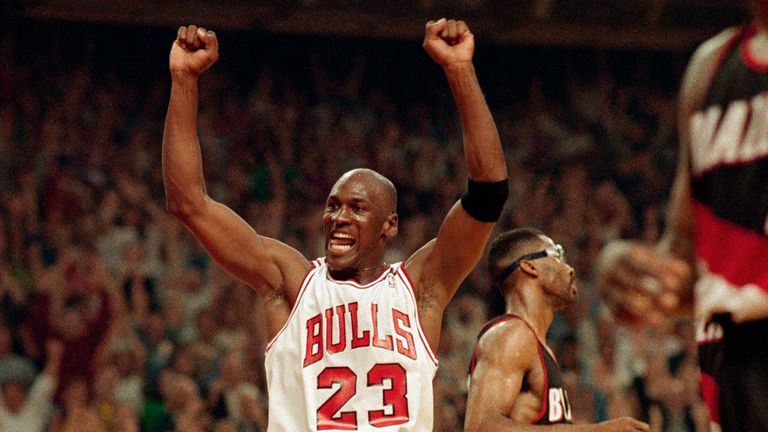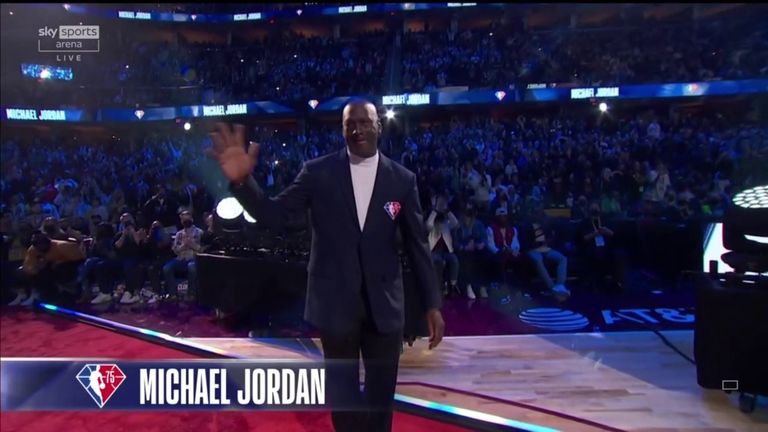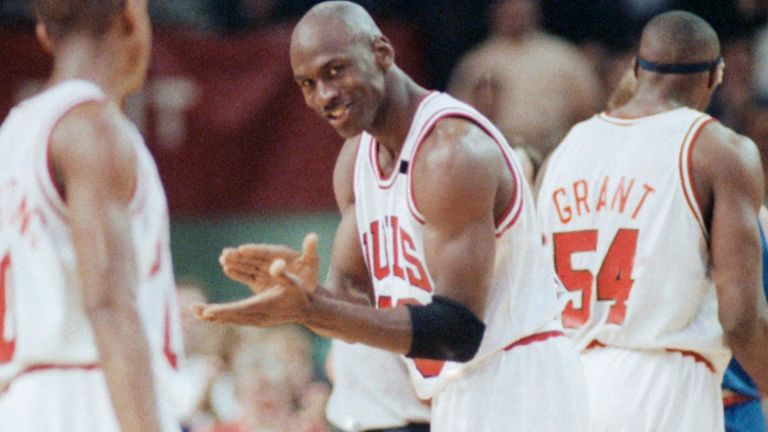BJ Armstrong: How Michael Jordan carried the Chicago Bulls by understanding everyone's jobs on both ends of the floor
In the second of a revealing three-part series of columns, BJ Armstrong talks exclusively to Sky Sports about former team-mate Michael Jordan
Wednesday 30 March 2022 15:59, UK
One of the most frequently used turns of phrase in this sport is: "he put the team on his back".
In most instances, it's used when a player shoulders a load that allows the team to be successful by producing big numbers and perhaps being a big scorer and facilitator for the team - or an influential defender.
Michael Jordan was all of those things but there was one key difference when it came to MJ.
- BJ on MJ: Double-nickel game showed new aspect of Jordan's greatness
- BJ Armstrong: Without Bill Russell, there's no Jordan, Kobe or LeBron
- BJ Armstrong: What it's really like being an NBA All-Star
- BJ Armstrong: Embiid's rise to superstardom is a sporting fairytale we should all celebrate
Most of the time, when referring to someone in this context it refers to a player's individual contribution and how he helps the team achieve their goals - but I cannot think of anyone who is so laser-focused that they can do all of that individually and simultaneously work out what everyone else on the team needs to be successful at the same time.
Michael Jordan could.
There are some players who have such a high IQ that they are aware of how their contribution affects the team and can recognise patterns of play and read the game in such a way that they can be a step ahead of the action at times - but nobody is so talented that they can entirely dominate opposition players on both ends and still be aware of how every scenario presented can be manipulated to best benefit the individuals on his team as well as the team as a whole.
Michael Jordan was.
The truth is that MJ was not just the solar plexus of the greatest Chicago Bulls teams but at times his influence stretched to every sinew of the operation. There were great players around him but he knew how to best get them going and he understood what everyone needed to be successful.
This wasn't just down to his talent or awareness or IQ or determination and focus even. It all started with selflessness and respect. Respect as a team-mate and respect for the game.
Sanctity of the locker room
Despite his greatness and all of the circus that surrounds that, one thing he never violated is the respect of that locker room, and the respect of what it meant to be a team-mate. He didn't demand extra space when he probably could have and should have because, let's face it, the media came to really see him.
As far as he was concerned though, he was just one of the guys. He went out of his way to make sure that he was no different to anyone else up until the game started, then he went out of his way to make sure that he did everything within his power to help us win that game. That's why he was so demanding on himself as well as everyone else because he respected that game and he always respected everyone who put on that uniform.
For example, he would never ever interfere with someone's routine. Whatever their routine was, he respected that. He didn't come in with loud music playing or something like that. He respected the space.
One of my pet peeves is people who are not respectful of time. He was very respectful of time and he just respected other people and I always respected that, in turn, because he could have done whatever he wanted. If he ever was running late, because he had to do extra interviews or something, he would say 'hey guys, my bad' and he was always respectful to the sanctity of that space and the team.
Of course, he realised there was a level that he had ability-wise that the rest of us didn't have. There are levels to this game and he was right at the very top, perhaps even over and above that but it didn't change his behaviour.
Team-mate 2.0 – Know your role and everyone else's
All of that respect built up to Michael Jordan being a great team-mate, but not in the way that other players are great team-mates. Like everything else with MJ, he was unique in his greatness.
Every night, Michael Jordan would be up against whoever the star player on the other team was and there are all of the pressures that come with that, because in the end, it came down to whether he was going to be able to deliver.
But I remember one day at training, as we were going through the scouting report, he came up to me - and he never called me BJ, he called me 'Kid' - he was like 'hey Kid, I'm coming to you early in the game because I know you haven't been shooting well'. For no reason at all.
Now, I was only getting five-to-seven shots every night. He's got the team, he's got the matchup, he's got the national television audience, they're triple teaming him… out of all the things to say, with all of that to contend with, he's telling me 'I want you to get going tonight, and I'm coming to you early. I'm going to take on all the double team so that you can get good looks at the basket. I need you to hit those shots'.
I'm thinking about all of the things that are going on: we've got defensive schemes to think about - we're going to double-team this guy, and here are the rotations; this is how we're playing screen and roll - everything else that we're having to think about. Yet, here is the man who is going to be the fulcrum of our team both ends and who the opposition are going to concentrate their focus on both offensively and defensively - and out of all the things that are on his mind at that time, he's thinking about helping me score.
Why is that on his mind to say to me? Why would he even know with my little five-to-six-or-seven shots that I was fortunate enough to get? Why would he even have noticed that? The guy just had 50-something points - why was he looking at my stats in the game before?
And it wasn't only me he did that kind of thing with everyone. That is just an entirely different level. His awareness to know what the team was doing collectively and as individuals was simply incredible. I was struggling to keep track of all my responsibilities sometimes, just trying to get to know the Xs and Os of my matchup and execute our team game plan.
He knew the game plan, knew his opponents, knew how to do all of that - and knew it not just for himself but for everyone else. He would not only do it on the offensive end, he would do it on the defensive end. He just knew.
MJ would say things like: 'don't worry about it if he ever beats you but if he's going to beat you on the dribble, you only let him beat you going left because I can help so send them my way. Don't worry about it, but don't let him beat you on the right'. So, as a result, the confidence that me and everyone else he had said similar things to had was massive.
But then I was thinking: wait a minute, what about his matchup? He's guarding Reggie Miller or Joe Dumars, or someone like that… so how did he have this level to understand what his job was, what the team's job was, but also everyone else's and where they were maybe going to need a little extra support?
'Force this guy this way, I promise you, I'll be there. Just force him that way. I'm going to double back once my guy passes the ball, and cuts through, I'm going to double back. Don't let him go to the middle because I'm going to double backward he'll never see me' - that is how he would talk.
He had this deep understanding of the totality of everything, and that to me, I found completely fascinating because most people might say 'I'm playing against a great player, I don't have time, maybe tomorrow night I can help you but tonight I got to focus in'. That didn't matter with MJ. Every single night, he understood the totality of the game at a different level that was more detailed than the coaches had given us and gave his time to help his team-mates better.
Living in the silence
What I did notice - and I think everybody around the team probably noticed it - is he really took time to fall into this mode of silence. He was very, very comfortable with silence. I also noticed that he liked playing on road better than at home because he loved the silence of the road.
When you're playing and the arena is loud and you're doing something spectacular, it's all well and good but - and this is something I now look for - all great players have to live in silence, because they can silence the crowd.
If you're not comfortable with the silence and living out there, then it's like being stranded on an island. You have to be comfortable on the island or it won't end well. Some people will get stranded on the island and they won't survive. Other people will get stranded on that island and you come back a year later, they've figured out a whole system of life, are friends with the natives, and have created a world. That was him.
He was very, very comfortable in the silence and he got these moments where he could be incredibly silent. If you watched him, he was incredibly silent before everything and I always believed that he was able to tap into something. Everything was just very clear for him. Somehow, he figured out how to get "into the zone" on a nightly basis and that is why he was a serial winner.
BJ Armstrong is a regular pundit on Sky Sports Heatcheck every week. Watch more live NBA games (TV listings here) on Sky Sports this week, subscribe to view the live action.







